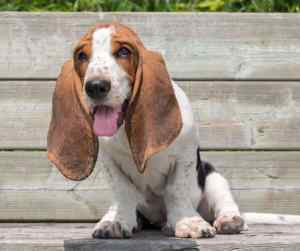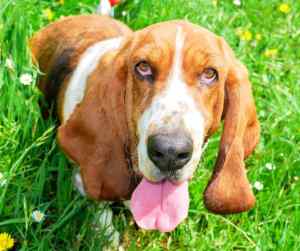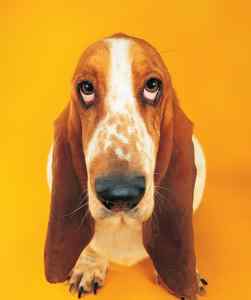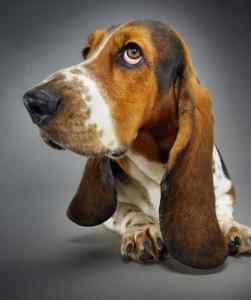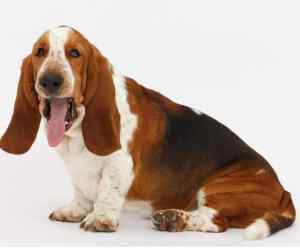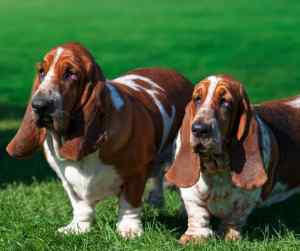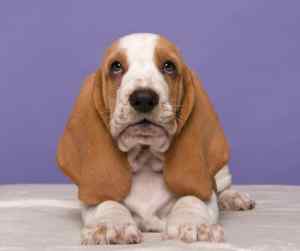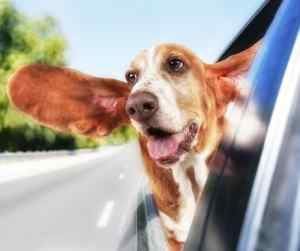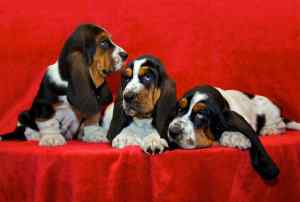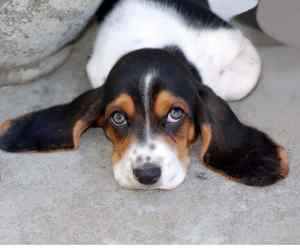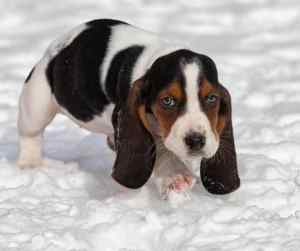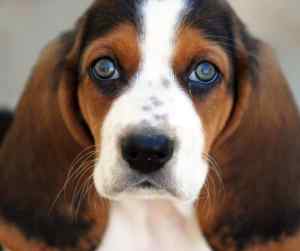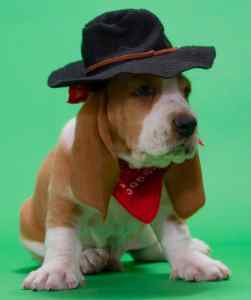The Basset Hound is a distinctive dog breed known for its long ears, droopy eyes, and short, sturdy legs. Originating from France, the breed descends from ancient hounds used for hunting small game by scent. The name “Basset” comes from the French word “bas,” meaning “low,” referring to the breed’s low-slung stature.
Basset Hounds possess an exceptional sense of smell, second only to the Bloodhound among dog breeds, which makes them excellent trackers. Their calm and friendly demeanor, coupled with their patience and perseverance in tracking, has made them popular both as hunting companions and as family pets.
Physically, Basset Hounds have a distinctive look that sets them apart from other breeds. They are medium-sized dogs with a heavy-boned structure, a deep chest, and a muscular build that belies their short stature. Their coat is short, smooth, and dense, providing protection in all kinds of weather, and can come in a variety of colors including tri-color (tan, black, and white), black and white, brown and white, or red and white.
Basset Hounds also have a notable feature in their long, velvety ears that can reach past their nose when stretched out. These ears help to stir scents from the ground towards their nose, aiding in their olfactory prowess. Additionally, their expressive eyes and wrinkled foreheads often convey a look of solemnity or melancholy, although the breed is known for its gentle and affectionate nature.
When considering adding a Basset Hound to your family, it is important to understand their temperament and care requirements. Basset Hounds are typically good-natured, laid-back, and sociable, making them excellent companions for children and other pets.
However, their strong hunting instincts may compel them to follow a scent trail, so a secure yard and leash walking are essential. They require moderate exercise to maintain their health and prevent obesity—a common issue in the breed due to their love of food and tendency towards laziness. Regular grooming is also necessary to keep their coat in good condition and to manage shedding. Basset Hounds are intelligent, but their independent nature can make training a challenge; they respond best to positive reinforcement techniques. Overall, with proper care and attention, Basset Hounds can be loving and loyal additions to any home, providing affection and entertainment with their charming personalities.
Basset Hound History
The Basset Hound, with its distinctive long ears and droopy eyes, has a history that can be traced back to France in the Middle Ages. Its ancestry is believed to stem from the St. Hubert Hound, the ancestor of the present-day Bloodhound, and was bred by monks in the Abbey of St. Hubert in Belgium. The Basset Hound was developed to hunt small game such as rabbits and hare. Its name is derived from the French word “bas,” which means low, reflecting the dog’s stature. The breed’s keen sense of smell is second only to that of the Bloodhound, and its short, sturdy legs allow it to navigate through dense underbrush while keeping its nose close to the ground to track scents.
By the 16th century, the Basset Hound had become a popular choice for French aristocrats for the purpose of hunting. The dogs would be followed on foot rather than on horseback due to their slow pace, which made them ideal for hunters who preferred a more leisurely approach. Their amiable nature and unique appearance also made them favored companions beyond the hunting grounds. It wasn’t until the late 19th century that the Basset Hound started gaining popularity outside of France. Sir Everett Millais is credited with bringing the first Basset Hound to England in 1866. He exhibited the dog, named Model, at a dog show, and the breed quickly captured the interest of British dog enthusiasts.
The Basset Hound’s popularity soared internationally when it reached the United States in the early 20th century. It was recognized by the American Kennel Club (AKC) in 1885, and the breed’s lovable demeanor and distinctive look made it a fixture in American culture. Bassets were often featured in advertisements, television, and film, which contributed to their fame.
One of the most recognizable Bassets was Fred, the companion of detective Columbo in the television series of the same name. The breed’s charm continues to win hearts, and while they are not as commonly employed as hunting dogs today, Basset Hounds remain a beloved choice for families and dog lovers, treasured for their gentle temperament and endearing appearance.
Basset Hound Appearance
Although small for the hound group, Bassets are medium sized dogs. Full grown Basset Hounds generally weigh between 55 and 65 pounds, and rarely stand more than 20 inches tall. Pleading eyes and long, droopy ears are the trademark characteristics of Basset Hounds. Most Bassets have white coats covered with random black and brown patches. Their hair is short, does not shed badly, and requires very little grooming.
Basset Hounds, while regarded as small in comparison to other members of the hound group, are indeed medium-sized dogs with a distinctive presence. Known for their sturdy build, they carry a considerable amount of weight for their size, with fully grown individuals typically tipping the scales at 55 to 65 pounds. Despite their heft, Basset Hounds are not tall creatures; they rarely exceed a height of 20 inches at the shoulder. This unique combination of weight and height results in a low-slung, powerful body that is well-suited to endurance over speed, reflecting their historical use for hunting.
The physical allure of Basset Hounds is often attributed to their soulful appearance, characterized by their pleading, deep-set eyes and remarkably long, droopy ears. These expressive features not only endear them to people but also serve a practical purpose: the ears help to stir up scents from the ground while tracking, and the sorrowful gaze belies a keen intelligence and a gentle nature. This breed’s easygoing and affectionate temperament makes them a beloved companion in many households, and their distinctive look has made them a recognizable and iconic breed around the world.
In terms of maintenance, Basset Hounds are relatively low-maintenance when it comes to their coat care. They possess a short, dense coat that does not tend to shed excessively, sparing their owners from the intense grooming requirements of longer-haired breeds. The typical Basset Hound coat showcases a pattern of white with black and brown patches, which can range from a classic tri-color to a two-tone arrangement. Regular brushing is usually sufficient to keep their coat in good condition, ensuring these hounds look their charming best without demanding an arduous grooming routine.
Basset Hound Temperament and Behavior
The Basset Hound, with its distinctive long ears, droopy eyes, and short legs, is not only charming in appearance but also has a temperament that endears it to many. These dogs are renowned for their gentle, laid-back, and friendly nature. They tend to form strong bonds with their families and are known for their loyalty and affectionate behavior. Basset Hounds are patient and tolerant, making them an excellent choice for families with children. Their amiable disposition also means they generally get along well with other pets. Despite their calm demeanor, they can be quite playful and enjoy engaging in activities with their human companions, although their energy levels are not as high as some other breeds.
Basset Hounds are inherently social creatures and do not like to be left alone for extended periods; they thrive on companionship and interaction. These dogs are often described as “clownish,” with a penchant for making their owners laugh with their humorous antics and expressive faces. However, their need for constant company can lead to separation anxiety if they are not properly trained and conditioned to spend time alone. This breed may exhibit stubbornness at times, which can pose a challenge during training sessions. Positive reinforcement techniques work best, as Bassets respond well to treats and praise. Consistency and patience are key in overcoming their occasional obstinacy.
Behaviorally, Basset Hounds have a strong hunting heritage, having been bred to track and hunt small game. Their incredible sense of smell is second only to the Bloodhound, and they can become single-minded when they pick up an interesting scent. This can sometimes lead them to wander off if they are not in a secure area. Owners should be mindful of this trait and provide a safe, enclosed space for their Basset Hounds to explore outdoors. Additionally, while they are not typically yappy dogs, Basset Hounds do have a deep, sonorous bark that they will use when they feel it’s necessary, such as alerting their family to the presence of strangers or when they are in pursuit of a particularly intriguing scent.;
Basset Hound Activity Needs
Basset Hounds, with their distinctive long ears, droopy eyes, and short legs, may not look like the most active of breeds, but they do have specific activity needs that are important for their health and well-being. Originally bred as scent hounds for hunting small game, Basset Hounds possess a strong instinct to follow scents and a surprising amount of stamina. Despite their laid-back and sometimes stubborn demeanor, they require regular exercise to maintain a healthy weight and to keep their minds stimulated.
A daily walk is essential, and it should be of sufficient length to satisfy their innate tracking instincts and to burn off energy. Because of their tendency to become engrossed in smells, it’s important that these walks are conducted on a leash, as a Basset Hound may otherwise become oblivious to commands when a scent captures its attention.
While Basset Hounds are not high-energy dogs, they still enjoy engaging in play and moderate activities that cater to their abilities. Activities such as gentle play sessions with their owners or interactive games that challenge their sense of smell can be particularly enjoyable and beneficial for this breed.
Puzzle toys that dispense treats can provide mental stimulation and keep them occupied. Additionally, despite their short stature, Basset Hounds can participate in dog sports like tracking or obedience, where they can showcase their natural talents in scent work.
These activities not only provide physical exercise but also help to strengthen the bond between the dog and its owner. However, it’s important to monitor their exercise, as their long backs can make them prone to spinal issues; hence, activities that involve a lot of jumping or strenuous exertion should be avoided.
In terms of exercise intensity, Basset Hounds do not need vigorous activity and are quite content with moderate exercise. Their endurance is more suited to a leisurely pace over longer distances rather than quick bursts of energy.
It’s also crucial to consider the weather when exercising a Basset Hound; their dense coat can make them prone to overheating in hot weather, and their short legs can make swimming difficult, so they should always be supervised around water. As with any pet, it’s essential to provide a Basset Hound with a balanced diet in combination with regular exercise to prevent obesity, which is a common health concern for the breed.
Overall, Basset Hounds are companionable pets that thrive with loving attention and activity that keeps their body and mind in good shape.
Basset Hound Grooming Tips
Grooming a Basset Hound is an essential part of their care routine, aimed at maintaining their overall health and appearance. Known for their distinctive long ears, droopy eyes, and short legs, Basset Hounds have a short, dense coat that is relatively low-maintenance. However, their unique physical traits do require some special attention. Regular grooming not only helps to reduce shedding and skin problems but also provides an opportunity to strengthen the bond between you and your pet.
One of the most important grooming tasks for a Basset Hound is ear care. Their long, floppy ears are prone to infections because they can trap moisture, dirt, and debris. To prevent these issues, it’s essential to check and clean their ears weekly using a vet-approved ear cleaner and a soft cloth or cotton ball. Never insert cotton swabs into the ear canal. Additionally, their nails should be trimmed regularly to prevent overgrowth that could lead to discomfort or difficulty walking. Since they’re not particularly active dogs, their nails may not naturally wear down, making it crucial to keep an eye on their length.
When it comes to coat care, Basset Hounds require brushing once or twice a week to help distribute natural skin oils and remove loose fur. A rubber grooming mitt or a hound glove can be effective tools for this breed, as they’re gentle on the skin and remove dead hair efficiently.
Bathing should be done sparingly, only when the dog is particularly dirty or smelly, as overbathing can strip the coat of its natural oils and cause skin irritation. When bath time does come around, it is important to use a dog-specific shampoo and make sure to thoroughly rinse and dry all the folds and creases in their skin to prevent any moisture-related issues. Regular grooming, along with a balanced diet and plenty of love, will keep your Basset Hound looking and feeling their best.
Caring For Your Basset Hound
Caring for a Basset Hound, with their distinctive long ears, droopy eyes, and short legs, requires attention to their unique physical and emotional needs. Basset Hounds are a friendly, laid-back breed, originally bred for hunting small game. Their keen sense of smell and strong tracking instincts make them excellent companions for outdoor activities. However, as a pet, this breed thrives on human companionship and requires regular interaction to stay happy and healthy.
Ensuring they have a loving environment, plenty of affection, and opportunities for gentle playtime is crucial. Basset Hounds are also prone to separation anxiety, so it’s important not to leave them alone for extended periods.
Physically, Basset Hounds need moderate exercise to maintain a healthy weight and prevent obesity, which they are prone to due to their build and love for food. Daily walks are a must, but they should be kept at a pace that is comfortable for their short legs.
Their long ears need regular checking and cleaning to prevent infections, and their nails should be trimmed to avoid discomfort while walking. Basset Hounds also tend to drool, so having a cloth handy to wipe their jowls now and then is advisable. Despite their low-to-the-ground stature, they should be discouraged from jumping on and off furniture to protect their backs and joints.
One of the breed’s most significant health concerns is bloat, a life-threatening condition that requires immediate veterinary attention. To help prevent this, it’s advisable to feed them smaller, more frequent meals rather than large ones and to avoid exercise right after eating.
Regular veterinary check-ups are essential to monitor their overall health and catch any potential issues early. Because of their calm demeanor, Basset Hounds can be great family pets, getting along well with children and other animals when properly socialized. However, their stubborn streak may pose a challenge in training, so patience and consistency are key. With proper care, a Basset Hound can be a loyal and affectionate addition to any family, providing years of joy and companionship.
Basset Hound Nutrition and Feeding
Bassets have a unique body structure, with short legs and a long, heavy body, which can predispose them to obesity if their nutritional needs aren’t managed properly. As such, Basset Hound nutrition should focus on a balanced diet that maintains their ideal weight and supports their joint health. High-quality dog food with a proper ratio of protein, fats, and carbohydrates is essential.
Protein supports muscle maintenance, while the right types of fats provide energy and help keep their coat healthy. Carbohydrates offer fiber for digestive health, but should be given in moderation to avoid unnecessary weight gain. Feeding Basset Hounds with foods rich in omega-3 fatty acids can also help support their joint health, which is crucial for this breed.
When feeding a Basset Hound, portion control is critical. Overfeeding can lead to obesity, which can exacerbate health problems such as hip dysplasia and intervertebral disc disease – conditions that Basset Hounds are prone to due to their long spines and heavy bodies. It’s important to adhere to feeding guidelines based on the dog’s age, size, and activity level, and meals should be divided into at least two servings per day to help with digestion and weight management.
Treats should be given sparingly and factored into the total daily calorie intake. Basset Hound owners should also ensure that their pets have constant access to fresh water, as proper hydration is essential for overall health.
Lastly, the specific needs of each Basset Hound may vary, and it’s important to adjust their diet as they age or if they have specific health issues. Puppies require more calories and nutrients to support their growth, while senior dogs may need diets with fewer calories and more joint support supplements.
Regular check-ups with a veterinarian can help determine if a Basset Hound has any special dietary requirements. Additionally, some Basset Hounds may have food sensitivities or allergies, which would necessitate a special diet to avoid adverse reactions. By paying close attention to their Basset Hound’s nutrition and feeding routines, owners can help ensure their companion remains healthy, happy, and active throughout their lives.
Training Your Basset Hound
Training a Basset Hound, like any other breed, requires patience, consistency, and an understanding of the breed’s unique characteristics. Basset Hounds, with their long ears and soulful eyes, are often seen as laid-back and even a bit stubborn, which can pose a challenge when it comes to training. However, they are also highly food-motivated and eager to please their owners, which can be used to an owner’s advantage.
The key to training a Basset Hound is to start early, as puppies are more adaptable and receptive to learning new behaviors. Positive reinforcement techniques, such as treats and praise, work well with this breed, as they respond better to encouragement rather than harsh discipline.
Short, engaging training sessions will help keep a Basset Hound’s attention, as they can easily become bored with repetitive tasks.
Socialization is a vital component of training for Basset Hounds. Due to their strong sense of smell and tracking instinct, Basset Hounds can be prone to following their noses, which can sometimes lead to selective hearing. Early socialization with people, other dogs, and different environments will help them become well-adjusted adults. This exposure teaches them to be comfortable in various situations and can reduce the chances of developing anxiety or fear-based behaviors.
When training a Basset Hound, one must also remember to be firm yet gentle to establish leadership and structure without breaking the dog’s spirit. Since they were bred as pack animals for hunting, they appreciate knowing their place in the family pack and look to their owners for guidance and approval.
Finally, it is essential to address the Basset Hound’s propensity for obesity by incorporating training exercises that keep them physically active. Despite their short legs and heavy bone structure, Basset Hounds benefit from regular walks and play sessions that will help maintain their health and manage their weight. Training activities that stimulate their minds, such as scent work or puzzle toys, can tap into their natural abilities and keep them mentally engaged.
Remember, a tired Basset Hound is a well-behaved Basset Hound. With their amiable disposition and a little creativity in training approaches, Basset Hounds can become obedient companions who are as well-behaved as they are endearing.
Basset Hound Health Concerns
Basset Hounds are prone to several health issues that prospective and current owners should be aware of. These concerns are largely a result of their unique physical structure and genetics, which can contribute to various medical conditions that require attention and care throughout their lives.
One of the primary health concerns for Basset Hounds is related to their skeletal structure. Their short stature, combined with a heavy bone structure, puts a significant strain on their joints and spine, leading to potential problems such as:
– Intervertebral Disc Disease (IVDD): A condition affecting the spinal discs that can lead to pain, nerve damage, and even paralysis.
– Hip Dysplasia: A malformation of the hip joint that can cause arthritis and lameness.
– Elbow Dysplasia: Similar to hip dysplasia, this affects the elbow joints and can lead to mobility issues.
– Osteochondritis Dissecans (OCD): A joint condition where the bone underneath the cartilage of a joint dies due to lack of blood flow.
– Patellar Luxation: The dislocation of the kneecap, which can lead to discomfort and lameness.
Another area of concern is their propensity for obesity. Basset Hounds have a natural inclination for weight gain due to their body structure and love for food, which can exacerbate joint issues and lead to other health problems such as:
– Heart Disease: Excess weight can put additional stress on the heart, leading to cardiovascular issues.
– Diabetes Mellitus: Obesity is a risk factor for diabetes, which requires lifelong management.
– Respiratory Difficulties: Excess weight can also lead to breathing problems, especially during exercise or in hot weather.
Finally, Basset Hounds are also susceptible to certain conditions affecting their ears and eyes. Their long, floppy ears are prone to infections and require regular cleaning and monitoring. Eye conditions are also a concern, with several potential issues that owners should watch for:
– Glaucoma: Increased pressure within the eye that can lead to pain and vision loss.
– Entropion: A condition where the eyelid rolls inward, causing irritation and potential damage to the eye.
– Cherry Eye: A prolapse of the third eyelid gland, which can be seen as a red mass in the corner of the eye.
– Progressive Retinal Atrophy (PRA): A degenerative eye disorder that can lead to blindness.
In conclusion, while Basset Hounds make affectionate and loyal companions, their unique physical characteristics require owners to be vigilant about their health. A combination of regular veterinary check-ups, a well-managed diet, and appropriate exercise can help mitigate some of the breed-specific health concerns.
Understanding and addressing these issues early on can ensure that Basset Hounds live a comfortable and happy life.
Is the Basset Hound the Right Dog Breed For You?
Deciding whether a Basset Hound is the right dog for you involves understanding the breed’s unique characteristics, temperament, and care requirements. Basset Hounds are easily recognized by their long, droopy ears, mournful eyes, and short, stout legs, which contribute to their distinctive look.
Originally bred for hunting small game by scent, these dogs have an incredible sense of smell, second only to the Bloodhound. Despite their hunting heritage, Basset Hounds are typically laid-back, friendly, and affectionate pets.
They are known for their gentle and placid nature, making them an excellent choice for families. However, their calm demeanor shouldn’t be mistaken for laziness; these dogs do enjoy walks and playtime, and they require regular exercise to maintain a healthy weight and prevent boredom.
One of the biggest considerations when thinking about bringing a Basset Hound into your life is their need for patient and consistent training. Basset Hounds can be stubborn and may require more time to train than other breeds. Their strong sense of smell can easily distract them during training sessions, so it’s important to keep training engaging and to use positive reinforcement techniques.
Additionally, they are known to be vocal dogs, which can include baying and howling, especially if left alone for extended periods. Prospective owners should be prepared for this breed’s vocalizations and ensure they can provide enough companionship to keep their Basset Hound content.
When it comes to grooming and health care, Basset Hounds require regular maintenance. Their long ears can trap moisture and dirt, making them prone to infections if not cleaned regularly. Owners will need to establish a routine of ear cleaning and checking their Basset Hound’s eyes for signs of irritation or infection. As with many purebred dogs, Basset Hounds have predispositions to certain health issues, including hip dysplasia, elbow dysplasia, and bloat.
Potential owners should be aware of these conditions and be prepared for possible veterinary care that may arise. If you’re someone who appreciates a laid-back companion, doesn’t mind a bit of drool, and is willing to commit to the grooming and health care needs of this lovable breed, a Basset Hound might just be the perfect dog for you.
More Information about the Basset Hound Dog Breed
Thank you for checking out our Basset Hound dog breed information guide. Check out our other dog breeds starting with B, or learn about other medium sized dog breeds a to z. A wealth of dog breed information awaits you on Dogs and Puppies Central.

